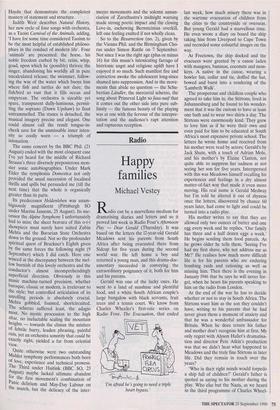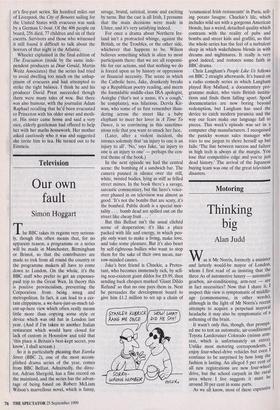Radio
Happy families
Michael Vestey
adio can be a marvellous medium for dramatising diaries and letters and so it proved last week in Radio Four's Afternoon Play — Dear Gerald (Thursday). It was based on the letters the 12-year-old Gerald Meadows sent his parents from South Africa after being evacuated there from Sidcup for five years during the second world war. He left home a boy and returned a young man, and this drama-doc- umentary succeeded in conveying the extraordinary poignancy of it, both for him and his parents.
Gerald was one of the lucky ones. He went to a land of sunshine and plentiful food, and a white South African couple's large bungalow with black servants, fruit trees and a tennis court. We know from Charles Wheeler's first-rate series on Radio Four, The Evacuation, that ended 'I'm afraid he's going to need a triple heart bypass.' last week, how much misery there was in the wartime evacuation of children from the cities to the countryside or overseas. But young Gerald had a marvellous time. He even wrote a diary on board the ship taking him from Liverpool to Cape Town and recorded some colourful images on the way.
At Freetown, the ship docked and the evacuees were greeted by a canoe laden with mangoes, bananas, coconuts and mon- keys. A native in the canoe, wearing a bowler hat, collar and tie, doffed the hat, bowed and burst into a rendering of the `Lambeth Walk'.
The prosperous and childless couple who agreed to take him in, the Stirtons, lived in Johannesburg and he found to his wonder- ment that it was the custom to have at least one bath and to wear two shirts a day. The Stirtons were enormously kind. They grew to love him as if he were their own and even paid for him to be educated at South Africa's most expensive private school. The letters he wrote home and received from his mother were read by actors; Gerald's by Jack Shute, with a touch of Adrian Mole, and his mother's by Elaine Claxton, not quite able to suppress her sadness at not seeing her son for five years. Interspersed with this was Meadows himself recalling his experiences and feelings in a dry almost matter-of-fact way that made it even more moving. His real name is Gerald Medway but I'm told he altered it out of shyness once the letters, discovered by chance 60 years later, had come to light and could be turned into a radio play.
His mother writes to say that they are allowed only two ounces of butter and one egg every week and he replies, 'Our family has three and a half dozen eggs a week.' He begins sending them food parcels. As he grows older he tells them, 'Seeing I've had my first shave, why not address me as Mr?' He realises how much more difficult life is for his parents who are enduring bombing raids and rationing as well as missing him. Then there is the evening in January 1946 that he says he will never for- get, when he hears his parents speaking to him on the radio from London.
At the end of the war he has to decide whether or not to stay in South Africa. The Stirtons want him as the son they couldn't have, writing to his parents that he had never given them a moment of anxiety and that he was a wonderful ambassador for Britain. When he does return his father and mother don't recognise him at first. My only regret with Alyson Hallet's dramatisa- tion and director Pete Atkin's production was that we didn't hear what happened to Meadows and the truly fine Stirtons in later life. Did they remain in touch over the years?
`Who in their right minds would torpedo a ship full of children?' Gerald's father is quoted as saying to his mother during the play. Who else but the Nazis, as we heard in the third programme of Charles Wheel- er's five-part series. Six hundred miles out of Liverpool, the City of Benares sailing for the United States with evacuees was sunk by a German U-boat. Of the 406 people on board, 256 died, 77 children and six of their escorts. Survivors and those who witnessed it still found it difficult to talk about the horrors of that night in the Atlantic.
Wheeler explained in the final edition of The Evacuation (made by the same inde- pendent producers as Dear Gerald, Martin Weitz Associates) that the series had tried to avoid dwelling too much on the unhap- piness of evacuees and had attempted to strike the right balance. I think he and his producer David Prest succeeded though there were many tales of woe. But there was also humour, with the journalist Adam Raphael recalling that he'd been evacuated to Princeton with his older sister and moth- er. His sister came home and said a very nice, elderly gentleman had offered to help her with her maths homework. Her mother asked cautiously who it was and suggested she invite him to tea. He turned out to be Einstein.



























































































 Previous page
Previous page